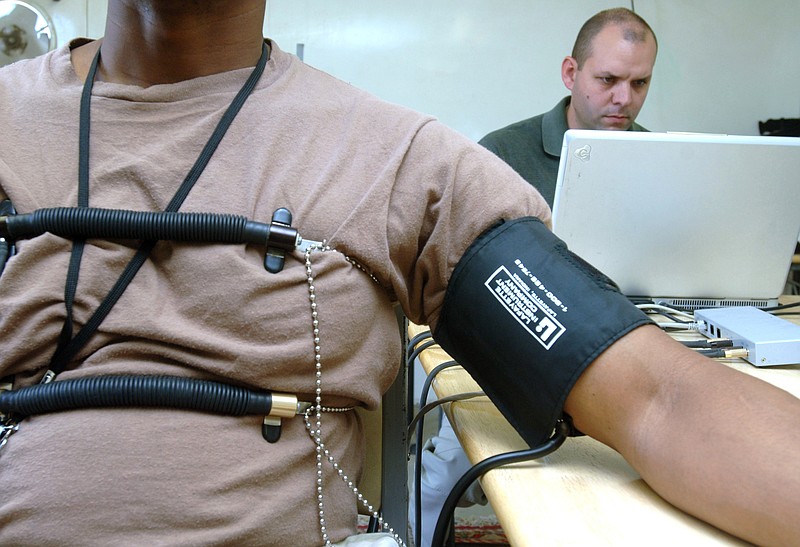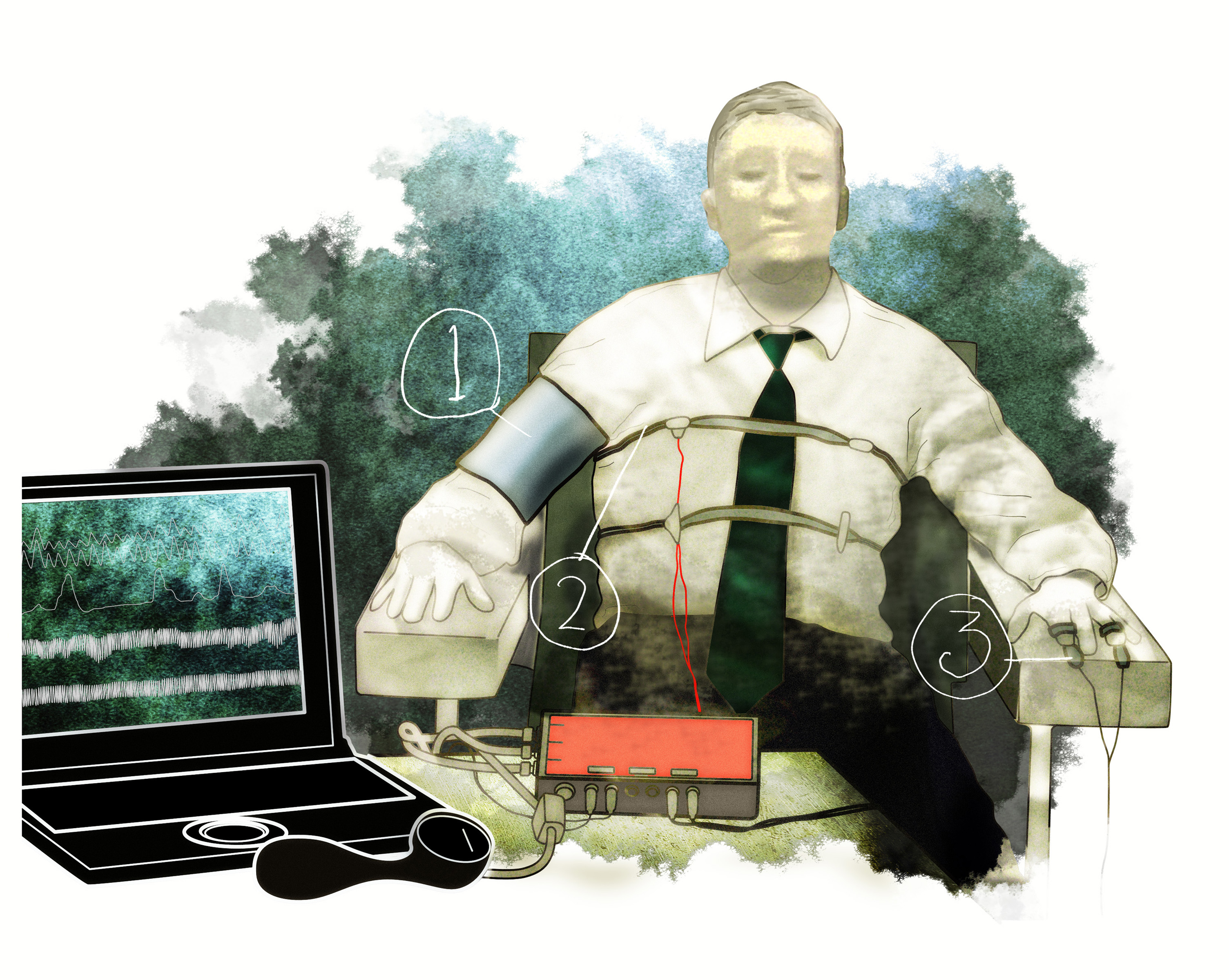The man was suspicious that his girlfriend was having an affair.
The girlfriend insisted she wasn't.
Despite the fact they were married to other people, the man strongly suspected his girlfriend had taken on a third sexual partner. So he asked her to take a polygraph test, better known as a lie detector.
She agreed.
And failed.
The test overwhelmingly confirmed she was lying and was cheating on her husband and her boyfriend - with another boyfriend.
The truth came out thanks to polygraph examiner Donna Roberts with Acumen Polygraph Services, who specializes in domestic issues, particularly fidelity. Though she cannot reveal the names of her clients, she can share their stories.
"It's like a soap opera," she says. "For most people, though, taking a polygraph tests gives them peace of mind."
An average of 60 percent of people taking the test are being truthful, she says, but the others are "lying out of their teeth."
Roberts says some of her clients are engaged couples who want validation that their spouse-to-be is telling the truth about everything ranging from infidelity to criminal history to job aspirations.
"Most of these couples walk out of here satisfied with the results," she says. "Others walk out screaming at others and screaming at me.
"Most of my cases are domestic related and involve fidelity," she says. "It's mostly women who want their partner or spouse to take the test, but it's the men who usually cry when they get busted.
"When men accuse women of infidelity, overwhelmingly the women pass the test. When women drag men in here and they willingly take the test, it's the men - still - who are usually guilty."
Roberts also conducts polygraph tests for a variety of categories, including financial issues, identity and legal reasons.
She's presently talking to a potential client whose husband has been accused of improper touching of her daughter, his 12-year-old stepdaughter. The stepfather is the one who requested the polygraph test, and the wife believes he is telling the truth. The child, who told a teacher about the alleged incident, which she says took place four years ago, has had behavioral issues in recent months. The couple is hoping the test will satisfy the teacher that their daughter, for whatever reason, fabricated the accusation.
Roberts, who won't conduct a polygraph on anyone younger than 16, believes polygraph results are reliable.
"It's a three-part test that includes a pre-test that lasts 20 to 30 minutes. We talk about their background and the questions I will ask on the actual test," she says.
The second part of the test is the "in-test" phase where she questions the clients while he/she is attached to the instrumentation that monitors whether or not the client is giving deceptive responses to the test questions, Roberts says. The machine measures such physical responses as respiratory rate, blood pressure, arm and leg movement and galvanic skin resistance, a fancy name for how much you sweat.
Former Hamilton County Criminal Court Judge Rebecca Stern, who worked many years in Chattanooga as an assistant district attorney, says she didn't allow polygraph results to be used as evidence, whether it was the police or the accused's lawyer who wants to submit them.
"The reliability of polygraph tests depends on the equipment and the person conducting the tests," she says. "However, they have proven not to be reliable enough to be admitted in evidence."
Coni Haley, 63, says she has been polygraphed multiple times over the last 40 years because she worked in retail, which wants to know the honesty of its employees both before and after they're hired. The first polygraph test was taken when she was a teenager working at Miller Brother's department store in downtown Chattanooga, the former North Georgia resident says.
"Everyone who had responsibility for cash, including me, was required to be polygraphed," says Haley, who now lives in Knoxville. "We were sent to an office located in one of the buildings next to Eastgate (shopping center in Brainerd). There was no sign on the office so that was disconcerting.
"The test itself took about 45 minutes, but they made a practice of keeping each person waiting for about an hour. I was very nervous because I had never taken one before and all the wires and clips were uncomfortable."
She was first asked basic questions including her name, age, address and place of birth before being asked if she'd ever stolen anything from an employer, had she ever committed a felon and other more-pointed questions.
"I did resent that test at the time because I had been working there for so long," Haley says. "It was also standard then to not let the employee know how they did on the test. My store manager told me that I passed the exam almost a week later."
Over the next 20 years working in retail, she says she took three other polygraph tests.
"Two were pre-employment and one was given to all the employees after someone 'misplaced' a shipment," she says. "I never failed any of the tests but, during that last one, I did stop the test when the examiner started asking questions about other employees.
"As a manager, I never had much confidence in the polygraph because I knew honest people who failed due to anxiety and dishonest people who always passed with flying colors."
Roberts admits that, on rare occasions, people have managed to manipulate the polygraph exams. "But it's rare," she says.
Holding a bachelor's degree in chemistry from the University of Tennessee, Roberts received her polygraph certification at Troy University in Sandy Springs, Ga., in 2011. She opened her practice in Chattanooga in 2012.
She says it's mostly women who want their spouse or significant other to take the test. Most of her clients range 25 to 40 years old, but she has had some in their 70s, including a couple where the man thought his wife was having affairs because she enjoyed hugging other men.
"She hugged men all the time and he didn't like it," Roberts says. "He figured since she liked it so much she was probably having sex with them, too. After 30 years of marriage, he didn't trust her.
"But she had nothing to hide so she took the test and passed it with flying colors. He was so convinced that she was having affairs, he had a hard time accepting the results. The lady didn't like me when she left my office."
Younger clients often take the test to solidify a budding relationship, usually before they get engaged, she says. "Both parties are willing to take the test because they don't have anything to hide. When they pass the test, it's a very happy moment."
A man who recently married a woman from Jamaica wanted his wife to take the test to prove her fidelity - after he had an affair before he met her, Roberts says.
"He had broken up a married couple after having an affair with the wife," Roberts says. "He was afraid you reap what you sow and he thought his new wife was having an affair. He said he had to know if she was being true to him."
She passed and he was satisfied.
But there are those who aren't, Roberts says.
"A man wanted to know if the woman was true to him and, turns out, she wasn't," she says. "She failed the test and the boyfriend believed the results. He told her he didn't trust her. She went after my license."
And it's not unusual for people to break down and confess after failing a polygraph test, she says.
"Some people have a 'come-to-Jesus' moment and break down and tell the truth. It feels good to them. The average person wants to unburden themselves and just tell the truth. It feels safe to be honest.
"But sometimes the truth hurts."
Contact Karen Nazor Hill at khill@timesfreepress.com or 423-757-6396.


